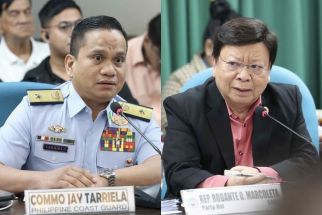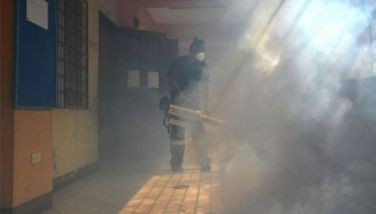US to beef up hunt for Abu-JI terrorists
September 19, 2006 | 12:00am
HONOLULU — The United States is increasing its support for the ongoing military offensive in Sulu against the Abu Sayyaf and Jemaah Islamiyah to hasten the capture of Abu Sayyaf chief Khadaffy Janjalani and Umar Patek and Dulmatin of JI, Defense Secretary Avelino Cruz said here yesterday.
Cruz said Rear Adm. William VanMeter Alford Jr., chief of staff of the United States Pacific Command (USPACOM), made the commitment in a meeting with President Arroyo during her stop here on Sunday.
Mrs. Arroyo was here to mark the 100th anniversary of the arrival of the first Filipino migrants to the United States.
Also present during the meeting were Foreign Affairs Secretary Alberto Romulo and National Security Adviser Norberto Gonzales.
"The USPACOM told us that their support for the Sulu operations would continue and they are looking at how to increase that support," Cruz told reporters.
Executive Secretary Eduardo Ermita earlier disclosed that US military units in Mindanao are providing intelligence to Philippine troops in Sulu tracking down Abu Sayyaf top leader Janjalani and the two suspected JI bombers.
Ermita said US troops are gathering intelligence through electronic means but did not elaborate.
Cruz said latest intelligence assessment indicated that the three terror leaders are still trapped in Sulu.
Cruz said the USPACOM was "very satisfied" and "very happy" with the ongoing military operations.
"They can see that the training they are giving us, the tactics, are bearing fruit on the ground. It’s just a matter of time, you just keep at it and one of these days we’ll get our desired results as far as hunting these terrorists," he said.
Dulmatin and Patek are the allegedly brains of the October 2002 Bali bombings in Indonesia that killed more than 200 people. Patek and Dulmatin carry a $1-million and $10-million reward from the US Department of Justice, respectively.
Both the Abu Sayyaf and the JI are linked to Saudi dissident Osama bin Laden’s al-Qaeda network.
Cruz added that Alford, who heads US forces in the Pacific region, has agreed to expand US anti-terrorism and anti-insurgency training of Philippine troops.
Improving military operations against terror groups and communist rebels, including the ongoing offensive against the Abu Sayyaf and Jemaah Islamiyah in Sulu, convinced Alford to extend training.
"We talked about how we can further strengthen our partnership, particularly the socio-economic component, training and assistance," Cruz told reporters.
He said Alford conveyed the sentiment of the USPACOM that it is very satisfied with the results of the training programs for infantry battalions it began giving last year, particularly the success of military humanitarian and offensive operations in Basilan, which is now being replicated in Sulu.
He said Mrs. Arroyo has given instructions to Philippine Ambassador to the US Willy Gaa to review existing areas of cooperation between the Philippine military and the USPACOM where improvements were needed.
"The skills set that these battalions will obtain can be used against terrorists and the CPP-NPA. These are the same trainings and either way these capabilities can be used for internal security operations," Cruz said.
He said the existing training program with the USPACOM of military units is to be expanded to 12 Army infantry battalions to be trained each year for the next six years, including two battalions from the Marines and one each from the Philippine Army’s Special Forces and the Scout Rangers.
The training program includes the USPACOM helping the Philippine military come up with a standardized program of instructions and doctrine and the setting up of a national training facility in Fort Magsaysay in Nueva Ecija as well as expanding the subject matter in the training modules.
Included in the training program are military intelligence, enhancement of legal knowledge, civil-military operations and strategic communications, he said.
"The focus of all these are counter-insurgency and counter-terrorism," Cruz said.
He said Alford also briefed Mrs. Arroyo on the disaster-management procedures of the USPACOM that the Philippines can learn from. There was no mention however of the oil spill in Guimaras.
Cruz said Rear Adm. William VanMeter Alford Jr., chief of staff of the United States Pacific Command (USPACOM), made the commitment in a meeting with President Arroyo during her stop here on Sunday.
Mrs. Arroyo was here to mark the 100th anniversary of the arrival of the first Filipino migrants to the United States.
Also present during the meeting were Foreign Affairs Secretary Alberto Romulo and National Security Adviser Norberto Gonzales.
"The USPACOM told us that their support for the Sulu operations would continue and they are looking at how to increase that support," Cruz told reporters.
Executive Secretary Eduardo Ermita earlier disclosed that US military units in Mindanao are providing intelligence to Philippine troops in Sulu tracking down Abu Sayyaf top leader Janjalani and the two suspected JI bombers.
Ermita said US troops are gathering intelligence through electronic means but did not elaborate.
Cruz said latest intelligence assessment indicated that the three terror leaders are still trapped in Sulu.
Cruz said the USPACOM was "very satisfied" and "very happy" with the ongoing military operations.
"They can see that the training they are giving us, the tactics, are bearing fruit on the ground. It’s just a matter of time, you just keep at it and one of these days we’ll get our desired results as far as hunting these terrorists," he said.
Dulmatin and Patek are the allegedly brains of the October 2002 Bali bombings in Indonesia that killed more than 200 people. Patek and Dulmatin carry a $1-million and $10-million reward from the US Department of Justice, respectively.
Both the Abu Sayyaf and the JI are linked to Saudi dissident Osama bin Laden’s al-Qaeda network.
Cruz added that Alford, who heads US forces in the Pacific region, has agreed to expand US anti-terrorism and anti-insurgency training of Philippine troops.
Improving military operations against terror groups and communist rebels, including the ongoing offensive against the Abu Sayyaf and Jemaah Islamiyah in Sulu, convinced Alford to extend training.
"We talked about how we can further strengthen our partnership, particularly the socio-economic component, training and assistance," Cruz told reporters.
He said Alford conveyed the sentiment of the USPACOM that it is very satisfied with the results of the training programs for infantry battalions it began giving last year, particularly the success of military humanitarian and offensive operations in Basilan, which is now being replicated in Sulu.
He said Mrs. Arroyo has given instructions to Philippine Ambassador to the US Willy Gaa to review existing areas of cooperation between the Philippine military and the USPACOM where improvements were needed.
"The skills set that these battalions will obtain can be used against terrorists and the CPP-NPA. These are the same trainings and either way these capabilities can be used for internal security operations," Cruz said.
He said the existing training program with the USPACOM of military units is to be expanded to 12 Army infantry battalions to be trained each year for the next six years, including two battalions from the Marines and one each from the Philippine Army’s Special Forces and the Scout Rangers.
The training program includes the USPACOM helping the Philippine military come up with a standardized program of instructions and doctrine and the setting up of a national training facility in Fort Magsaysay in Nueva Ecija as well as expanding the subject matter in the training modules.
Included in the training program are military intelligence, enhancement of legal knowledge, civil-military operations and strategic communications, he said.
"The focus of all these are counter-insurgency and counter-terrorism," Cruz said.
He said Alford also briefed Mrs. Arroyo on the disaster-management procedures of the USPACOM that the Philippines can learn from. There was no mention however of the oil spill in Guimaras.
BrandSpace Articles
<
>
- Latest
- Trending
Trending
Latest
Trending
Latest
Recommended






























